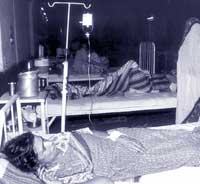|
|
|

Remembering the forgotten
Remembering those who
cannot remember is the underlying motto of the Alzheimer's and Related Disorders Society
of India (ARDSI), Delhi Chapter. An incurable, progressive illness, Alzheimer's robs
patients of a lifetime of memories. Affecting people above the age of 60 years, its main
symptoms are confusion, personality and behaviour changes, loss of the ability to think,
reason and remember. Eventually sufferers can no longer recognise friends and relations
and are unable to care for themselves.

ARDSI DELHI
|
The Delhi chapter of ARDSI was set up in March 1994 by a small
group of dedicated workers, with the main objective of establishing a network of societies
globally to look into Alzheimers. It is affiliated to the Alzheimer's Disease
International (ADI) that has a national office in Kochi and chapters in different parts of
India. This non-governmental organisation (NGO) focuses on training the care-givers on how
to take care of an Alzheimer patient. Recognising the special needs and care required for
Alzheimer's patients, the ARDSI-Delhi has a volunteer system wherein volunteers are
trained extensively on providing this special care. Beginning with just one–two
volunteers in 1994, the organisation now has 24 volunteers. These volunteers are people
who have direct access to the patients in the family. ARDSI-Delhi has linkages with
renowned neurologists of various hospitals in Delhi, to whom the patients are referred for
a quick diagnosis. The NGO trains volunteers and the caregivers on the medications needed
and maintains a follow up of each patient registered with them. More than 120 Alzheimer's
patients are registered with them today.
A Helpline functions from Monday-Saturday 9 a.m. to 6 p.m,
providing support and information. The organisation aims to open a support day care centre
for the patients in the near future. World Alzheimer's Day, which falls on September 21,
is celebrated to take the cause of the patients further and to ensure that the voice of
Alzheimer's disease is heard.
The ARDSI-Delhi Chapter can be reached at:
PBC, 1st floor, 8 Community Centre
East of Kailash, New Delhi 110 065.
Ph: 011-26423300
Helpline 011-26435922
E-mail:ardsidc@hotmail.com
Contaminated IV fluids
Nearly 40 per cent of drugs in hospitals are administered through intravenous fluids (IV).
Routine quality testing thus gains importance. However, reports of contaminated IV fluids
continue. A critical life-saving device, a substandard IV fluid now takes on the role of a
cruel life-killer. Until the early 1990's mainly small units manufactured IV fluids,
almost forcing this segment of the pharmaceutical industry to adjust with poor quality
standards. With health care facilities increasing, the demand and market for IV also
increased.

SARVESH
|
But setting up of huge units and acquiring of latest ISO
standards approval does not all the time ensure the best of IV fluids. Sporadic cases of
pseudomonas endotoxin occurring in the fluids resulting in fatalities in surgery are often
reported. Says Anupam Sachdev, pediatric oncologist at the Sir Ganga Ram Hospital, New
Delhi, "The hospital purchases the IV fluid in good faith from the company. Though we
on our own do check for contamination based on clarity of the fluid, there is precious
little that a doctor can do about microscopic contamination." Harit Chaturvedi,
Senior Consultant, Oncology, Apollo Hospitals, Delhi says that this problem has been
around for years. "It is unfortunate," he says, that, "Doctors have so far
not come forward to fight this grave menace."
In 1998, the National Human Rights Commission set up an
expert panel to look into the problem of contaminated IV fluids. The interim report states
that a few bottles okayed for usage could not be a guarantee for the entire batch. It
further added that the companies used world-class Rommelag technique (blow-fill-seal
technology) and that contamination could have taken place not at this stage of
manufacturing, but during transportation.
Human life has become so cheap that a few deaths during
an operation or a camp does not cause any flutter. Contaminated IV fluids though an old
problem needs to be addressed as an emerging issue of health concern. It is time doctors
got together collectively to ensure safety in health procedures.
Send in your reactions to:
Health and Environment Unit
Centre for Science and Environment
41, Tughlakabad Institutional Area
New Delhi – 110 062
E–mail:health@cseindia.org |
|

